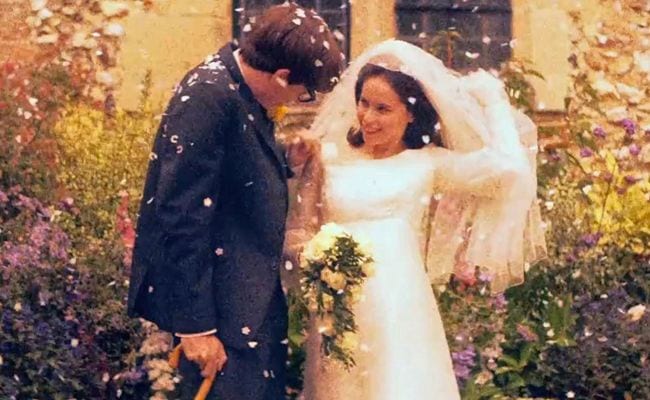
In most movies about great men, the wife is either a nagging shrew that resents her husband’s success or a devoted trophy wife with no apparent dreams of her own. In James Marsh’s The Theory of Everything (2014), Jane Hawking (Felicity Jones) is a woman with vulnerabilities and contradictions. She loves her husband Stephen (Eddie Redmayne) and vows to care for him as he suffers from amyotrophic lateral sclerosis (ALS), but she also cannot ignore her desires. She supports Stephen’s work as a physicist and wants him to succeed, but cannot deny her dreams. Jones conveys these contradictions with a slight shift in body language or facial expression, subtleties that speak volumes about her character. Jones, whose appearance in the indie romance Like Crazy (2011) turned a maudlin premise into a memorable motion picture, similarly elevates this film with her remarkable performance, and once again she deserves better.
The Theory of Everything is Jane’s story, but the filmmakers don’t fully commit to her point of view. Marsh and screenwriter Anthony McCarten give much screen time to Jane’s perspective after she marries Stephen, a refreshing shift in a genre and industry dominated by men’s stories. However, the film opens with Stephen and his time at Cambridge before diagnosis, and continues to check in with him at various intervals throughout the film, which suggests that the filmmakers aren’t entirely comfortable with pushing Stephen’s more popular story aside. This is a shame, not only because Jane’s memoir inspired the movie, but also because her portion of the film is more dramatically satisfying.
Jane’s story has not been told as frequently as Stephen’s, and it would have been fascinating to delve more deeply into her psychology. Why was she drawn to Stephen? What influenced her to stand by him for so many years? Such questions are briefly brought up but barely answered, and what we’re left with is a film that wants to privilege her story but can’t escape the conventions of the standard male-driven biopic in order to do so. (For more on the limitations of the life-spanning biopic format, see “Enough with the Biopic: A Re-Examination of Cinema’s Least Interesting Genre”, PopMatters, 5 January 2015.)
The Theory of Everything will appeal to those that like predictable movies for the entire family. There is nothing offensive about it. It is competently made and performed, and has no intentions to rock the boat or reinvent the wheel. Casual viewers in search of inspiration will be moved, and it may inspire young audiences to take up science, which isn’t the worst thing in the world. In addition to Jones’ powerful performance, there is the lush score by Jóhann Jóhannsson, the gorgeous cinematography by Benoit Delhomme, and the beautiful costumes by Steven Noble.
However, in a multimedia landscape when there is an overabundance of content, the worst thing that a film can be is merely adequate. The Theory of Everything isn’t terrible enough to become a cult classic like W.E. (2011) or Diana (2013), nor is it great enough to be remembered alongside masterpieces from 2014 like Selma or Foxcatcher. It is one of those by-the-numbers British films that exists because it can, partially in an attempt to garner awards attention for its rising star, and partially to extol a public figure whose legacy was never in doubt in the first place.
The dual format Blu-ray/DVD provides a few special features that might appeal to certain viewers. The commentary by Marsh is particularly informative, and the documentary “Becoming the Hawkings” demonstrates how the young actors prepared for their demanding roles. For some, knowledge of the process may detract from the magic of watching Redmayne and Jones inhabit the Hawkings, but aspiring actors should find comfort in learning that performances like these don’t spring from nowhere, and that they require hard work, patience, and a willingness to make mistakes.
It’s important to shine a light on debilitating disease at a time when people complain about their cell phone service, and it’s necessary to spread the message of science at a time when people deny the effects of global warming or the virtue of vaccinations. Surely, however, this can be done with more sophistication. Audiences are better off watching A Brief History of Time (1991), Errol Morris’ wonderful adaptation of Stephen’s best-selling book, and reading Traveling to Infinity: My Life with Stephen, Jane’s harrowing memoir upon which this film is based. The former will paint a fuller portrait of Stephen, the brilliant physicist who overcame many obstacles, and the latter will provide further understanding of Jane, the devoted wife who had an equally impressive existence of her own. The problem with The Theory of Everything is that it tries to tell both stories at once, and inevitably fails to offer substantial insights about either of them.

